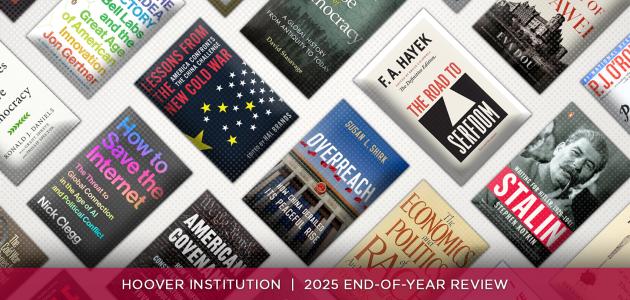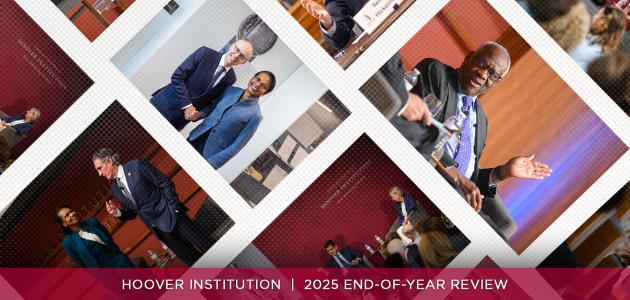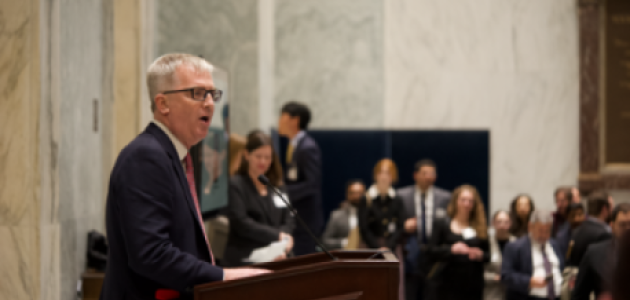In this edition of the Hoover Institution Briefing on the Effects of Technology on Economics and Governance, the Stanford Emerging Technology Review’s 2025 edition reaches policymakers in Washington, DC. A new podcast seeks to highlight the challenge and promise of frontier technology through the lens of Hoover and Stanford experts. And Hoover fellows tackle the continued impact of generative AI in national security, workplaces, and everywhere in between.
Featured Analysis

Stanford Emerging Technology Review Offers Policymakers New Insights into Implications of Cutting-Edge Tech
The 2025 edition of the Stanford Emerging Technology Review (SETR) report is now available, offering American policymakers a comprehensive overview of how ten frontier technologies, from artificial intelligence to robotics, are transforming the world.
A collaboration between the Hoover Institution and the Stanford School of Engineering, the report—based on leading research from Stanford scientists, engineers, and policy experts—serves as a one-stop primer on state-of-the-art innovations in these key domains, plus what to look out for in the future.
Beyond the report, the goal of the larger SETR partnership is ambitious: to transform technological education for decision makers in both the public and private sectors so that the United States can seize opportunities, mitigate risks, and ensure that the American innovation ecosystem continues to thrive.
The 2025 edition of the Stanford Emerging Technology Review launched in Washington, DC, with events and briefings, including a release event on Capitol Hill on February 25. Stanford and Hoover scholars met with officials across government. Several fellows, including Amy Zegart, Herb Lin, and Allison Okamura, held a roundtable discussion about SETR and its findings with the Council on Foreign Relations in New York on February 26.

SETR and Council on Foreign Relations Launch Limited Podcast Series
The Stanford Emerging Technology Review (SETR) and the Council on Foreign Relations (CFR) have collaborated to produce a limited podcast series to tell the stories of transformative technologies to US policymakers. The Interconnect, hosted by Hoover Policy Fellow and SETR managing editor Martin Peter Giles, brings together CFR experts and SETR contributors to unpack and explore the possibilities of one of the ten frontier technologies documented in SETR. The first three episodes tackle robotics, AI, semiconductors, and space.
Listen to episodes here.

China’s DeepSeek AI Escalates Fight to Innovate
In an op-ed at Fox News, Hoover Institution Director Condoleezza Rice and Senior Fellow Amy Zegart reflect on China start-up DeepSeek’s ability to release an open-source AI model, allegedly at a fraction of the cost and relative computing power of AI platforms from America’s leading tech companies. They write that at this moment in the global competition for leadership in frontier technology, Americans should adopt the attitude of “game on, not game over,” adding that “a principal foreign policy challenge for the nations is harnessing emerging technologies and understanding their implications fast and better than adversaries.”
They say that universities can help in sustaining America’s innovation leadership. The two scholars are cochairs of SETR.
Read more here (email registration required).

Drew Endy: Made in China 2025—Who is Winning?
In February, Science Fellow Drew Endy testified before the US-China Economic and Security Review Commission at a hearing on "Made in China 2025—Who Is Winning?" He told policymakers that from a biotechnology perspective, China is at or above the United States in key elements of biotechnology’s “strategic stack” (education, research, entrepreneurship, and manufacturing) and is now better organized, with significant state support and plans for the future. So, what does this mean for US competition in this sector? Endy said the biomanufacturing and research sectors in the United States routinely rely on support services and supplies from Chinese firms and that this dependency could be exploited as a vulnerability.
Watch his testimony here.
Highlights

Hoover’s Bio-Strategies and Leadership Group Joins with OECD to Navigate Global Future of Synthetic Biology
The Hoover Institution’s Bio-Strategies and Leadership Group joined with the Organization for Economic Cooperation and Development (OECD) to foster continued dialogue about the future of the synthetic biology industry on February 27, 2025.
The gathering follows The Spirit of Asilomar, a meeting of synthetic biology experts from around the globe held in February on the Asilomar Conference Grounds in Pacific Grove, California. That event marked the fifty-year anniversary of the original Asilomar Conference on Recombinant DNA in 1975, when pioneers in synthetic biology discussed how to regulate the continued growth of their field and prevent it from harming humanity.
The gathering also featured industry figures and officials from the US Department of State tasked with managing the global development and control of frontier technologies.
Read more here.

The Impact of Generative AI in the Workplace
On the latest episode of Economics, Applied, Senior Fellow Steven J. Davis speaks with Harvard economist David Deming, who is looking into the use of generative artificial intelligence (AI) in the workplace. A recent paper from Deming finds nearly 40 percent of US workers surveyed have used generative AI before, and 24 percent of respondents said they used it for a workplace purpose in the previous week. Deming says there is already evidence that generative AI has boosted productivity in US workplaces.
Listen to the episode here.

The US Must Embrace a Winning Biotech Strategy
Writing in the Boston Globe, Bio-Strategies and Leadership participants and Hoover fellows Drew Endy and Mike Kuiken argue that the United States must adopt a coordinated plan to continue its synthetic biology leadership in the world. They write that when the journal Cell launched in 1974, all but one of its articles were written by an American. When Cell picked its fifty most influential scientists last year, eleven were from the US and nine were from China.
They detail the raft of national programs and measures China has developed to fund and develop a burgeoning synthetic biology industry and argue that America must match that or the field will become yet another arena where everything seems to be made in China: “Just as we have experienced with other US innovations, from solar panels and batteries to computer chips, if we fail to scale manufacturing in the United States, then our best bio-innovations will be brewed in China, from Narcan to nitroguanidine.”
Read more here (subscription required) .
Fellow Spotlight

Drew Endy is a science fellow and senior fellow (courtesy) at the Hoover Institution. He leads Hoover’s Bio-Strategy and Leadership effort, which focuses on keeping increasingly biotic futures secure, flourishing, and democratic. Professor Endy also researches and teaches bioengineering at Stanford University, where he is the Martin Family University Fellow in Undergraduate Education, senior fellow (courtesy) of the Freeman Spogli Institute for International Studies, and faculty codirector of degree programs for the Hasso Plattner Institute of Design.
For more insight on important technological issues visit
www.hoover.org/focus-areas/understanding-effects-technology-economics-and-governance























